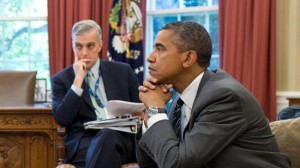This piece was reprinted by OpEd News with permission or license. It may not be reproduced in any form without permission or license from the source.
Source: Consortium News
White House Chief of Staff Denis McDonough pictured with President Barack Obama in the Oval Office. (This White House photo by Pete Souza was taken when McDonough was deputy national security adviser.)
Were White House Chief of Staff Denis McDonough not pushing for yet another war based on what look to be false pretenses, one might feel sorry for him after his multiple TV appearances on Sunday arguing for a military strike on Syria. This unenviable job fell to McDonough as pinch-hitter for the two more natural choices to push the Obama administration's case for a "limited" war on Syria.
An obvious choice would have been National Security Adviser Susan Rice, but her reputation for truthfulness got seriously tarnished after she made the rounds of the Sunday talk shows on Sept. 16, 2012, and stuck to inaccurate talking points about the attack on the U.S. "mission" in Benghazi, Libya.
Clapper also might have been asked embarrassing questions about why the four-page "Government Assessment of the Syrian Government's Use of Chemical Weapons on August 21, 2013," was released by the White House rather than by the DNI's office, thus suggesting that the white paper did not have the endorsement of the full U.S. intelligence community.
Citing the curious provenance of the "Government Assessment," Gareth Porter reported that the document appeared to be a political product of the White House rather than a professional assessment from the intelligence agencies. Yet, by implying that the document had the imprimatur of the U.S. intelligence community, the White House has used the white paper to preempt congressional questions about who was actually responsible for the Aug. 21 chemical incident in a Damascus suburb.
"Leading members of Congress to believe that the document was an intelligence community assessment and thus represents a credible picture of the intelligence on the alleged chemical attack of Aug. 21 has been a central element in the Obama administration's case for war in Syria," Porter wrote.
If you were in the White House, you wouldn't want Clapper to be asked how many U.S. intelligence analysts had doubts about whether the Syrian government launched an intentional chemical weapons attack on Aug. 21 and whether President Bashar al-Assad was responsible, would you?
Spinning the Case
To his credit, the handsome McDonough managed to appear courteous while filibustering the likes of CNN's Candy Crowley. Indeed, he delivered his memorized mantra better than Socrates himself, in "making the worse cause appear the better." But his assertions often varied widely from truth and logic. For instance, he declared:
"Nobody now debates the intelligence, which makes clear -- and we have high confidence about this -- that on August, in August, the Assad regime used chemical weapons against its own people. A former Iranian president has indicated he believes that. The entire world believes that. We're talking to Congress about that now. So Congress " has an opportunity this week to answer [a] simple question -- should there be consequences for him [Assad] for having used that material?"
Do you note the hyperbole in the major premise that "the entire world believes that" -- when clearly the entire world does not believe that, unless McDonough considers many in Congress, millions of average Americans and a significant number of world leaders to be out of this world? Even French President Francois Hollande, the chief international sidekick for this U.S. war plan, wants to wait and see what the United Nations inspectors conclude.
Yet, ever since John Kerry on Aug. 30 advertised the "Government Assessment," the administration's approach has been to require acceptance of that "assessment" as Bible truth and move directly to what the "consequences" should be for such an evil deed.
But some honest soul in the drafting process insisted on inserting a measure of doubt into the text: "Our high confidence assessment is the strongest position that the U.S. Intelligence Community can take short of confirmation." (emphasis added) Such phrasing is sometimes called a "trapdoor," used by analysts who might need to escape a conclusion if contrary new evidence arrives.
Yet, the modest caveat can't obscure the overriding purpose of the "Government Assessment" -- to paper over doubts about the hastily assembled intelligence as well as keeping all the supposed evidence secret, thus preventing any independent public scrutiny. [See Consortiumnews.com's "Should We Fall Again for "Trust Me'?"]
But -- surprise, surprise -- this well-worn tactic has proven to be largely effective with the mainstream news media, as shown by Candy Crowley's immediate response to McDonough, "Because everyone believes that ..."
Not So Fast!
The empirical "proof" that McDonough fell back on Sunday was nothing other than what he called "common sense" that Assad must be responsible for the attacks: "Now do we have irrefutable, beyond reasonable doubt evidence? This is not a court of law, and intelligence does not work that way," McDonough told Crowley.
It appears we are back to the Cheney/Bush days of "faith-based intelligence" when the "absence of evidence is not evidence of absence." It used to be that intelligence analysis relied chiefly on empirical data. "Common sense," especially when misshapen by intense political pressures, did not hack it.
(Note: You can view every article as one long page if you sign up as an Advocate Member, or higher).





